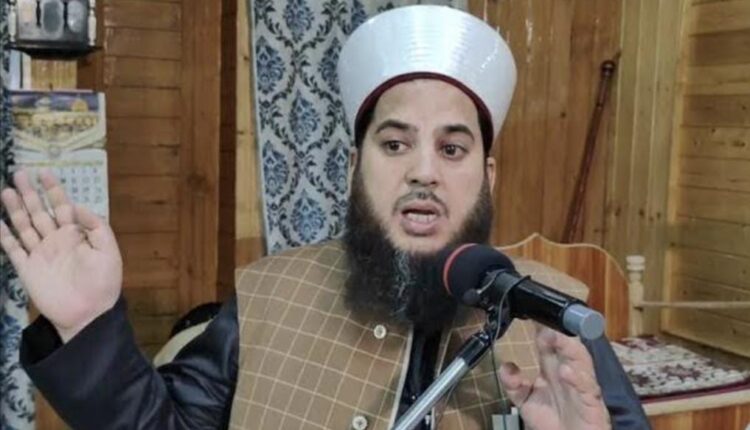Shaykh Hami: The Life and Legacy of a Kashmiri Spiritual Reformer
Tariq Ahmad Sauleh
When I think of those rare souls who have truly touched and transformed the moral and spiritual fabric of our valley, one name rises instantly in my mind: Dr. Shaykh Ghulam Rasool Hami, lovingly known to us all as Shaykh Hami (HH). Born in the quiet village of Bonizil in Ganderbal, his journey from humble beginnings to becoming a beacon of spiritual guidance and social reform has been nothing short of remarkable. Today, his influence extends far beyond Jammu & Kashmir, resonating with hearts across the country and even abroad.
In 2004, with the grace and help of Allah, Shaykh Hami founded Tahreek Karwan Islami International—a non-political, non-profit, religious and social movement. Its mission is both ambitious and deeply rooted in Kashmiri tradition: to revive the pure Sufi culture of our land, to spread the eternal teachings of our beloved Prophet Muhammad صلى الله عليه وسلم, and to extend compassion to the poor, the orphan, and the downtrodden. This is not merely an organisation—it is a family for the broken-hearted, a refuge for the spiritually lost, and a lamp of hope in the darkness of despair.
From day one, Karwan Islami has been defined by action rather than rhetoric. More than 650 madrasas now operate under its banner across the Valley, offering both Islamic and modern education. Thousands of orphans and children from impoverished families study there free of cost. The organisation also runs eight Darul-Ulooms, including the prestigious Markaz-ul-Madaris Al Jamiatul Qadria at Trehgam Shadipora, built on a sprawling 32 kanals of land. Here, young scholars learn Hifz-ul-Qur’an, Tafseer, Arabic, and Persian alongside science, computer literacy, and vocational skills—bringing together Deen and Dunya in harmony.
But Shaykh Hami’s vision does not stop there. His dream project—the Sheikh-ul-Alam Research University of Kashmir (SARUK)—aims to provide world-class Islamic education to our youth right here at home, sparing them the need to travel far away for advanced religious studies. The bill for its establishment has already been passed by the Assembly, and in a gesture of inclusivity, he has reserved 15% of its seats for poor students from Jammu, Ladakh, and Kashmir alike.
Education, however, is only one pillar of his mission. For over two decades—since the year 2000—Shaykh Hami has been at the forefront of the fight against the drug epidemic devastating Kashmiri youth. Through a combination of spiritual guidance, community outreach, and rehabilitation efforts, an estimated 70,000 to 1,00,000 young people have left the path of addiction to reclaim lives of dignity. His campaigns have included thousands of conferences, awareness drives, and the gathering of more than seven lakh signatures demanding a ban on liquor and narcotics. He has even filed a Public Interest Litigation to press the government into stronger action. Shaykh Hami’s philosophy is clear: we must heal both body and soul, for without purifying the heart, no recovery can be truly lasting.
His service knows no borders. Through the Imdaad Foundation, he has extended aid to the needy not only in Kashmir but as far as Burma—marking the first time humanitarian assistance from the Valley reached that troubled region. During the devastating 2014 floods, he did not remain in the safety of an office issuing instructions; he personally waded into floodwaters to help rescue stranded families.
The reach of his reform also includes Islamic libraries stocked with classical and contemporary works, ensuring that people of all ages have access to authentic religious knowledge. His preaching department sends trained scholars to towns and villages to spread the timeless Sufi message of love, peace, and brotherhood. In every gathering, he reminds us to follow the path of the saints—to despise the sin, not the sinner; to mend what is broken; and to love for the sake of Allah.
I have seen with my own eyes people arrive at his majlis in states of deep despair—some battling severe depression, others worn down by illness—only to leave with tears of relief, hearts lightened, and hope restored. Many even testify to recoveries from grave diseases, including cancer, attributing their healing to Shaykh Hami’s duas and moral counsel.
His speeches are not dry lectures; they are conversations from the heart, weaving together verses of the Qur’an, Hadith, the lives of the Awliya, and the pressing social challenges of our time. His recurring message is simple yet profound: progress without spirituality is hollow. Skills, jobs, and material gains are important, but without taqwa and moral grounding, no society can endure.
To me, Shaykh Hami is a living embodiment of the Qur’anic verse:
“And We have not sent you except as a mercy to the worlds” (21:107).
Every act of his life reflects service to Allah’s creation—be it rescuing a flood victim, guiding a youth away from drugs, or offering solace to the broken-hearted. He is at once a guide, a reformer, a healer, and above all, a humble servant of the Deen.
May Allah protect him, grant him a long and healthy life, and accept every drop of his effort for the Ummah. His mission is a reminder that Islam is not just to be spoken—it is to be lived. If we, even in small ways, walk upon the path he points to, then our valley, our people, and our hearts will surely be illuminated by the light of Iman.


Comments are closed.